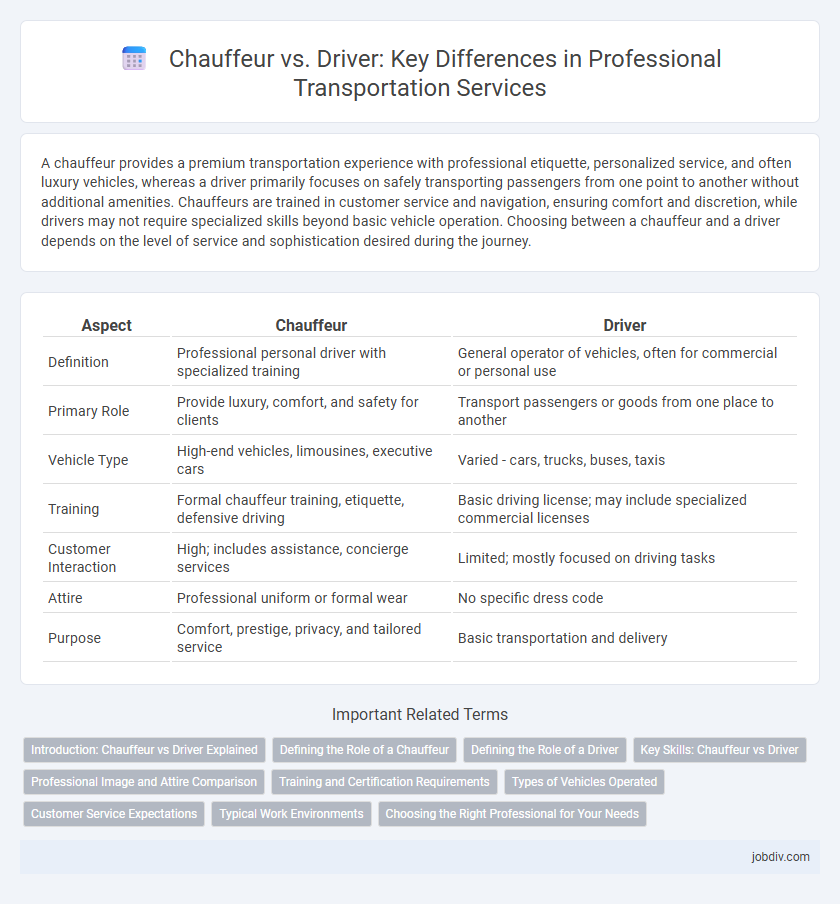A chauffeur provides a premium transportation experience with professional etiquette, personalized service, and often luxury vehicles, whereas a driver primarily focuses on safely transporting passengers from one point to another without additional amenities. Chauffeurs are trained in customer service and navigation, ensuring comfort and discretion, while drivers may not require specialized skills beyond basic vehicle operation. Choosing between a chauffeur and a driver depends on the level of service and sophistication desired during the journey.
Table of Comparison
| Aspect | Chauffeur | Driver |
|---|---|---|
| Definition | Professional personal driver with specialized training | General operator of vehicles, often for commercial or personal use |
| Primary Role | Provide luxury, comfort, and safety for clients | Transport passengers or goods from one place to another |
| Vehicle Type | High-end vehicles, limousines, executive cars | Varied - cars, trucks, buses, taxis |
| Training | Formal chauffeur training, etiquette, defensive driving | Basic driving license; may include specialized commercial licenses |
| Customer Interaction | High; includes assistance, concierge services | Limited; mostly focused on driving tasks |
| Attire | Professional uniform or formal wear | No specific dress code |
| Purpose | Comfort, prestige, privacy, and tailored service | Basic transportation and delivery |
Introduction: Chauffeur vs Driver Explained
A chauffeur is a professional driver typically employed to transport passengers in luxury vehicles, often providing personalized services including assistance with luggage and door opening. A driver generally refers to anyone operating a vehicle, focusing primarily on the task of driving without the additional customer service elements associated with chauffeurs. The distinction lies in the level of service, formality, and the type of vehicle driven, with chauffeurs commonly linked to higher-end, professional transportation.
Defining the Role of a Chauffeur
A chauffeur is a professional driver specifically trained to provide luxury transportation services, often employed to drive high-end vehicles for private clients or corporate executives. Unlike a general driver whose primary responsibility is simply operating a vehicle, a chauffeur emphasizes safety, discretion, etiquette, and personalized customer service. Key tasks include maintaining the vehicle's cleanliness, assisting passengers with luggage, and ensuring a comfortable and secure travel experience.
Defining the Role of a Driver
A driver operates vehicles to transport passengers or goods, often managing routes and vehicle maintenance without providing personalized service. In contrast, a chauffeur is specifically trained to offer luxury transportation, ensuring passenger comfort, discretion, and often handling door-to-door service with professional etiquette. The driver's role emphasizes functionality and efficiency, while a chauffeur combines driving skills with hospitality and client-focused interaction.
Key Skills: Chauffeur vs Driver
Chauffeurs possess advanced skills in professional etiquette, route planning, and passenger safety, often trained in luxury vehicle operation and client confidentiality. Drivers generally require proficiency in vehicle handling, adherence to traffic regulations, and basic maintenance knowledge, supporting diverse transportation needs. The distinction lies in chauffeurs' emphasis on personalized service and discretion, contrasting with drivers' focus on efficient and safe vehicle operation.
Professional Image and Attire Comparison
Chauffeurs maintain a polished professional image, often wearing tailored suits and ties that reflect luxury and exclusivity, distinguishing them from regular drivers. Drivers typically adopt practical uniforms or casual attire focused on comfort and functionality rather than style. This distinction in dress code enhances the chauffeur's role as a symbol of premium service and refined transportation experience.
Training and Certification Requirements
Chauffeurs undergo specialized training programs emphasizing luxury service, defensive driving, and client etiquette, often requiring certification such as the Certified Chauffeur Program or local limousine licenses. Drivers typically need a standard commercial driver's license (CDL) or appropriate vehicle-specific endorsements, with training focused on safety regulations and vehicle operation. Chauffeur certifications enhance professional credibility and ensure adherence to high service standards, while driver requirements prioritize regulatory compliance and operational competence.
Types of Vehicles Operated
Chauffeurs typically operate luxury vehicles such as sedans, limousines, and high-end SUVs, providing personalized and premium services for executives or special events. Drivers, by contrast, may operate a wider variety of vehicles including taxis, buses, trucks, or delivery vans, often focusing on routine transportation or commercial logistics. The distinction lies in vehicle type and service level, with chauffeurs specializing in upscale, client-centered transport and drivers covering broader transportation needs.
Customer Service Expectations
Chauffeurs are expected to provide personalized, high-end customer service, including professional attire, discretion, and a focus on passenger comfort beyond safe driving. Drivers typically prioritize efficient transportation and basic safety, with less emphasis on luxury or client interaction. Customer service expectations for chauffeurs include attentiveness to route preferences, assistance with luggage, and maintaining a polished, courteous demeanor at all times.
Typical Work Environments
Chauffeurs typically work in luxury settings such as private estates, corporate offices, and high-end hotels, providing personalized transportation for VIP clients. Drivers often operate in more varied environments, including public transit systems, delivery routes, and ride-sharing services, managing larger passenger volumes or goods. Both roles demand adherence to traffic regulations and vehicle maintenance, but chauffeurs prioritize comfort and discretion in exclusive environments.
Choosing the Right Professional for Your Needs
Selecting the right professional between a chauffeur and a driver depends on the level of service and expertise required, with chauffeurs offering luxury, discretion, and personalized attention often associated with high-end transportation. Drivers typically provide practical, cost-effective transportation focused on getting passengers safely from point A to B without additional amenities. Evaluating factors such as the occasion, desired vehicle type, professionalism, and customer expectations ensures the appropriate choice for seamless travel experiences.
Chauffeur vs Driver Infographic

 jobdiv.com
jobdiv.com